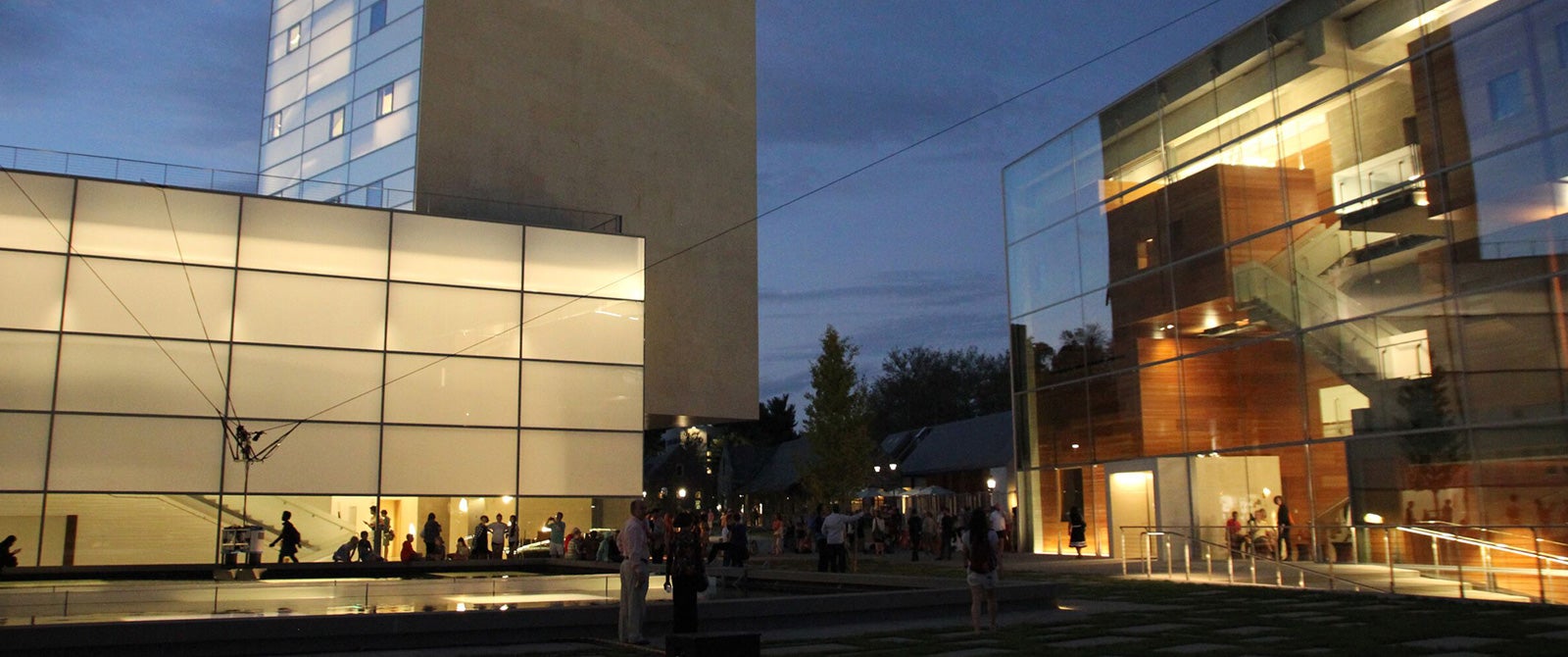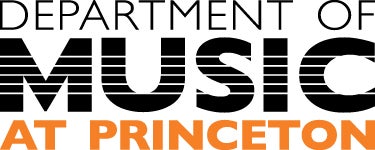
Scores: Contemporary Chamber Works
Curated by Juri Seo
Concert Information
STEVEN MACKEY conductor and host
JURI SEO guest composer and curator
NA-YOUNG BAEK cello
CHRIS KOMER horn
NJSO CHAMBER PLAYERS
The NJSO Chamber Players give the world premiere of an NJSO commission from Princeton-based composer Juri Seo, who curates a program of contemporary chamber and solo works by Korean, American, French and British voices.
Longtime NJSO collaborator Steven Mackey conducts and hosts informal conversations with Seo and the musicians in an event that celebrates a rich variety of contemporary scores in the acoustically and visually stunning Lee Music Performance and Rehearsal Room in Princeton University’s new Lewis Arts Complex.
This performance is approximately 60 minutes with no intermission.
- UNSUK CHIN ParaMetaString for String Quartet and Tape
- JONATHAN HARVEY Curve with Plateaux for Solo Cello
- OLIVIER MESSIAEN “Interstellar Call” from Des Canyons aux étoiles for Solo Horn
- TRISTAN MURAIL Seven Lakes Drive
- JURI SEO Sunlight (World Premiere, NJSO Commission)
- REYNOLD THARP San Francisco Night
-
About the Program
-
Notes from guest composer and curator Juri Seo
Jonathan Harvey thought of the cello as the most human of the instruments. Speaking in many voices (“poetic, exclamatory, dreamy …”), the cello in Curve with Plateaux draws an extraordinary melodic arc spanning seven octaves. It soars to an almost inaudible range at times. In his own description, the return of the low register suggests mortality, which, for the Buddhist composer, is inextricably linked to life.
Reynold Tharp’s San Francisco Night also reckons with mortality. The composer recalls listening to Györgi Ligeti’s Clocks and Clouds on a foggy day in San Francisco. Unbeknownst to Tharp, Ligeti had died earlier that day. The falling gestures, an allusion to the slowly descending fog, convey a sense of loss.
Tristan Murail’s Seven Lakes Drive is also inspired by a place—the Seven Lakes in upstate New York. As the drive along the lakes reveals a changing landscape against the ever-present backdrop of water, Murail’s melodies flow into “lakes of music,” merging into colorful harmonies derived from the natural harmonic spectrum.
ParaMetaString by Unsuk Chin is perhaps the most abstract piece on the program. Chin was directly inspired by the characteristic playing techniques of the string instruments: tremolos, harmonics and glissandos. Even without an overt narrative, Chin’s music conjures a sense of fantasy, with colorful sonorities moving evanescently.
Messiaen’s “Interstellar Call” is a movement from Des Canyons aux étoiles, a large orchestral work again inspired by the landscape of the continental United States (the rock formations at Zion and Bryce Canyon in Utah). Birdsong, Messiaen’s lifelong fascination, makes appearances throughout. Demarcated by long silences, the horn calls evoke a feeling of distance.
To add to this program, I decided to compose a piece that morphs slowly without clear breaks. It draws a curve made up of many little curves. A sunrise—violent, sudden and luminous—and the following dawn chorus comprise the central portion of the work. A few intertwining birdsongs transform into one another. In the end, I wanted to write music that was more about being a bird than listening to a bird. The ending is a simple meditation on a feather, symmetrically expanding, moving gently in the wind.
There are a few common threads that unify the works in this program. Much of the music is inspired by places imbued with sense and memory. There are various evocations of song—birdsong, for instance, or the song of a superhuman presence like the cello. All of the composers were touched by spectralism, a compositional attitude that approaches pitch as a primarily acoustical phenomenon. Most importantly, each of the pieces communicates through warmth and delight, attempting to connect, to inspire and to heal.
-
About the Artists
-
Steven Mackey, conductor and host
Steven Mackey—a Grammy Award winner lauded by Gramophone for his “explosive and ethereal imagination”—is regarded as one of the leading composers of his generation, with compositions ranging from orchestral and chamber music to dance and opera. Born in 1956 to American parents stationed in Frankfurt, Germany, his first musical passion was playing the electric guitar in rock bands based in northern California. He blazed a trail in the 1980s and 90s by including the electric guitar and vernacular music influences in his classical concert music. He regularly performs his own electric guitar concertos and numerous solo and chamber works. He is active as an improvising musician and performs with his band Big Farm.
Mackey’s music has been performed by leading musical institutions throughout the world, including the Los Angeles, BBC and New York philharmonics; San Francisco and Chicago symphonies; Philadelphia and Concertgebeouw orchestras and Brentano, Kronos and Arditti string quartets. He has received awards from the American Academy of Arts and Letters, a Guggenheim Fellowship, the Stoeger Prize from the Chamber Music Society of Lincoln Center and a Kennedy Center Friedheim Award.
Mackey is Professor of Music and former chair of the Department of Music at Princeton University.
Juri Seo, guest composer and curator
Juri Seo is a composer and pianist based in New Jersey. She seeks to write music that encompasses extreme contrast through compositions that are unified and fluid, yet complex. She merges many of the fascinating aspects of music from the past century—in particular its expanded timbral palette and unorthodox approach to structure—with a deep love of functional tonality, counterpoint and classical form. With its fast-changing tempos and dynamics, her music explores the serious and the humorous, the lyrical and the violent, the tranquil and the obsessive. She hopes to create music that loves, that makes a positive change in the world—however small—through the people who are willing to listen.
Her composition honors include a Guggenheim Fellowship, Koussevitzky Commission from the Library of Congress, Fromm Commission from Harvard University and Goddard Lieberson Fellowship from the American Academy of Arts and Letters. She holds a doctorate from the University of Illinois at Urbana-Champaign, and she also attended Rome’s Accademia Nazionale di Santa Cecilia and Seoul’s Yonsei University. In fall 2014, she joined the composition faculty at Princeton University as assistant professor. Visit juriseomusic.com for more information.
Na-Young Baek, cello
Winner of the Philadelphia Orchestra Greenfield Competition, Korean-born cellist Na-Young Baek made her American debut with the Philadelphia Orchestra in 2000. She has appeared as soloist with the Hudson Valley Philharmonic, DuPage Symphony Orchestra, Seoul Philharmonic, Korean Chamber Ensemble, Ulsan Symphony Orchestra, Wonju Philharmonic Orchestra, Greenwich Village Orchestra and Macau-Hong Kong-Taipei Symphony Orchestra.
At age 15, Baek became the youngest winner in the history of the prestigious Choong Ang Times competition in Korea and garnered the Virtuoso Prize at the first Tchaikovsky Competition for Young Musicians in Moscow. Baek was a prizewinner in the Gyeongnam International Competition and won first prize in Hudson Valley Philharmonic Competition and Holland-America Music Society Competition. She has given a recital at at Weill Hall at Carnegie Hall, presented by the Korea Music Society, and the Dame Myra Hess Concert Series in Chicago. An avid chamber musician, Baek has participated in and performed at the Marlboro Music Festival, Great Lakes Chamber Music Festival, Casals Festival, Aspen Music Festival and Isaac Stern Seminar in Israel. She has been featured at Carnegie Hall, the Kennedy Center, Salle Gaveau in Paris and Cadogan Hall in London and on NPR’s “Performance Today.”
Baek studied at the Curtis Institute of Music, then received a master’s at Yale University, artist diploma from The Juilliard School and Doctor of Musical Arts degree at Stony Brook University. She served as an adjunct faculty member at Kean University and is a member of the Sejong Soloists and East Coast Chamber Orchestra.
Chris Komer, horn
Kansas native Chris Komer is proud to be in his second season as Principal Horn of the NJSO, where he has been a member of the horn section for more than 18 years. A uniquely versatile musician, he is as at home in the concert hall (with appearances with the New York Philharmonic, NJSO, Metropolitan Opera and St. Paul Chamber Orchestra) and the recording studio (Barbra Streisand, Natalie Cole, Sting, David Byrne, Elvis Costello) as he is in the jazz club (Michael Brecker Quindectet, Jamie Baum Septet+, Lincoln Center Jazz Orchestra, Chuck Mangione).
Komer is also a highly sought-after chamber music artist, performing and recording regularly with the Burning River Brass, Filmharmonic Brass and Chamber Music Society of Lincoln Center, among others. As a veteran of New York’s Broadway show scene, he was principal horn of the recent revival of West Side Story and recently finished playing the revival of Miss Saigon. In 2009, he released his first solo piano CD of all original and improvised music, entitled Travlin’ Music.
Sponsors

Princeton University generously provides support for this program.